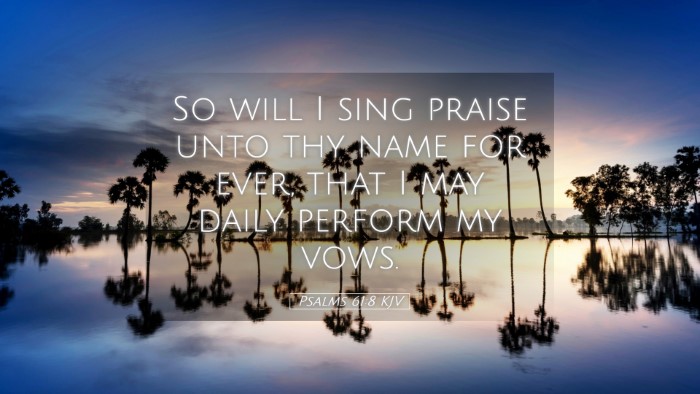Psalms 61:8 Commentary
Bible Verse: "So will I sing praise unto Thy name forever, that I may daily perform my vows."
This verse from Psalms 61 encapsulates a profound commitment to worship and fidelity in service to God. Commentators like Matthew Henry, Albert Barnes, and Adam Clarke provide valuable insights that deepen our understanding of its implications for the believer's life.
Overview of the Verse
Psalms 61:8 concludes a prayer of deep reliance on God. It expresses a firm resolve not only to worship but also to live in accordance with the promises made to the Lord. This dual aspect of worship—both vocal praise and active devotion—underscores a central theme in biblical spirituality: commitment to God must manifest through both praise and practice.
Insights from Matthew Henry
Matthew Henry emphasizes the personal nature of worship expressed in this verse. He notes that the psalmist, after pouring out his heart in prayer, resolves to return to God with songs of praise. This illustrates a critical dynamic in prayer: it is both a request for assistance and a commitment to respond in gratitude. Henry elaborates:
- Worship as Response: The act of singing praises acknowledges God’s sovereignty and goodness.
- Continual Commitment: The phrase "forever" indicates a lifelong dedication that transcends transient emotions.
- Daily Performance of Vows: This underscores the importance of fulfilling one's promises to God as an expression of faithfulness.
Insights from Albert Barnes
Albert Barnes provides a more theological exploration of the importance of praise as a lifestyle. He draws attention to how the psalmist’s intention to sing praises forever illustrates the eternal aspect of our relationship with God. Barnes highlights:
- The Nature of Praise: Authentic praise springs from an acknowledgment of God's marvelous works in our lives and is essential for spiritual health.
- Vows to the Lord: A vow represents a solemn promise, and Barnes notes that fulfilling one’s vows is significant in maintaining a strong covenant relationship with God.
- The Daily Aspect: Barnes underscores the need for regular, daily communion with God through prayer and praise as a source of strength and sustenance.
Insights from Adam Clarke
Adam Clarke approaches the text with a focus on the practical implications of the psalmist's commitment. He discusses the inherent challenge and necessity of worship, noting:
- Cultivating a Heart of Worship: Clarke suggests that true praise not only flows from joy but also from a recognition of God’s mercy and grace in times of trouble.
- Living Out Our Vows: He emphasizes that the act of daily fulfilling one’s vows is indicative of a mature faith—it is an outward expression of an inner reality.
- The Conjunction of Prayer and Praise: Clarke points out that prayer and praise are distinct yet interconnected—one cannot exist fully without the other in a vibrant spiritual life.
Theological Implications
This verse reflects significant theological tenets relevant for pastoral ministry and scholarly reflection:
- The Nature of God: The psalmist's commitment to God reveals the faithfulness and constancy of God's character—He is not merely a deity who responds occasionally but is always present in the life of the faithful.
- The Role of Worship: Worship is depicted as both an individual and communal activity which serves to reinforce the identity of God's people.
- Practical Application of Worship: The expectations of daily living out one’s vows serve as a reminder for believers today to integrate their faith into their everyday actions.
Conclusion
Psalms 61:8 is rich with meaning, portraying a vital relationship between the believer and God, characterized by continual praise and active commitment. As this commentary integrates insights from renowned scholarship, it encourages pastors, students, theologians, and scholars alike to reflect on their own responses of worship—distinctly understanding that both praise and the fulfillment of vows forge a deeper, more enduring faith. The call to worship is not only about expressing our gratitude and love towards God; it also challenges us to live faithfully in accordance with our commitments to Him.
This complete synthesis of thoughts from various public domain commentaries deepens one’s appreciation of the psalmist’s intentions and invites a renewed commitment to a lifestyle of praise and promise-keeping devoted to the Lord.


